Bihar Board Class 8 English Part III Chapter 13. My Shadow Text Book Questions and Answers
13. My Shadow
TEXTBOOK QUESTIONS AND THEIR ANSWERS
B. LET’S COMPREHEND :
B.1. THINK AND TELL:
B.1.1. Answer the following questions very briefly :
Q. 1. What is the funniest thing about the speaker’s (poet’s) shadow ?
Ans. The funniest thing about the speaker’s shadow is the way he likes to grow, which is not slow like the growth of a proper children.
Q. 2. What happened one morning before the sunrise?
Ans. One morning, before the sunrise, the speaker arose and went out of bed but his shadow kept sleeping in the bed.
Q. 3. Does the speaker’s shadow always remain the same ?
Ans. No, the speaker’s shadow, does not remain the same.
B.1.2. State whether the following statements are ‘True’ or ‘False’.
1. The speaker’s shadow jumps after him when he jumps into his bed.
2. At times, the speaker’s shadow is taller than him.
3. The speaker’s shadow always follows him.
4. The speaker’s shadow was very active.
Ans. 1. False, 2. True, 3. False, 4. False.
B.2. THINK AND WRITE:
B.2.1. Answer the following questions briefly.
Q. 1. What does the shadow of the speaker do?
Ans. The shadow of the speaker goes in and out with him.
Q. 2. How does the shadow grow?
Ans. The shadow sometimes shoots up taller like an India–rubber ball.
Q. 3. Why does the speaker call his shadow lazy?
Ans. The speaker’s shadow could not rise early in the morning, so he said him lazy.
B.2.2. Answer the following questions in about 50–60 words.
Q. 1. How does the shadow of the speaker behave? Does your shadow also behave similarly?
Ans. The shadow of the speaker moves with him. He goes in and out with him. He also sleeps with the poet and grows taller like India–rubber ball and gets so little that there is none of him at all.
Q. 2. Why does the speaker call his shadow ‘the funniest thing’?
Ans. The way of getting smaller or longer of the shadow is so peculier that the poet calls it the funniest thing.
Q. 3. Why do you think that the shadow of the poet did not accompany him before the sunrise? Explain.
Ans. The shadow of the poet had no existence before the sunrise because without light a shadow does not form. So, the shadow did not accompany him before the sunrise.
Q. 4. What do you like most about the poem ?
Ans. I like the personification of the shadow and its features composed as the features of a living thing most,
C. WORD STUDY:
Look at these words :
funny – funnier – funniest
little – more – most
shining – more shining – most shining
Fill in the blanks with suitable degree of adjectives.
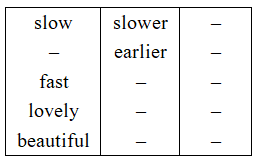
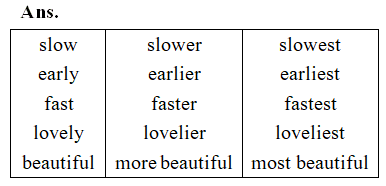
D.1. GRAMMAR :
Prepositions :
Read the following sentences:
There is some water in the bottle.
He is fond of his daughter.
He fell off the ladder.
In sentence 1, the word in shows the relation between two things-water and bottle. In sentence 2, the word of shows the relation between the adjective fond and the noun daughter. In sentence 3, the word off shows the relation between the verb fell and the noun ladder.
These words which are used before a noun or a pronoun to show its relationship with another word in the sentence are called prepositions. The noun or pronoun which follows a preposition is called its object. Note that pronouns used after a preposition should be in the objective case.
He is fond of her. (NOT He is fond of she.)
A preposition may have two or more objects; e.g.,
Between you and me there are few secrets. (Here the pronouns you and me are the objects of the preposition between.)
Prepositions show various kinds of relations. The most important among them are the following:
Place :
* She ran across the street.
* The boy fell among the thorns.
* We were at the foot of the hill.
* The thief was hiding behind the cupboard.
Time:
* I have a meeting in the afternoon.
* You must return before sunset.
* Wait till tomorrow.
* We waited for hours.
Method and manner :
* The letter came by post.
* He cut the cake with a knife.
* They fought with courage.
* They succeeded by hard work.
Reason and Purpose:
* She died of malaria.
* He trembled with anger.
* Smoking is injurious to health.
Possession :
* He is a man of principles.
* Mumbai is the financial capital of India.
* I saw a boy with red hair.
Direction and Motion :
* He fell into the well.
* He climbed up the tree.
* She walked towards the market.
* The moon moves around the sun.
Preposition – Time :
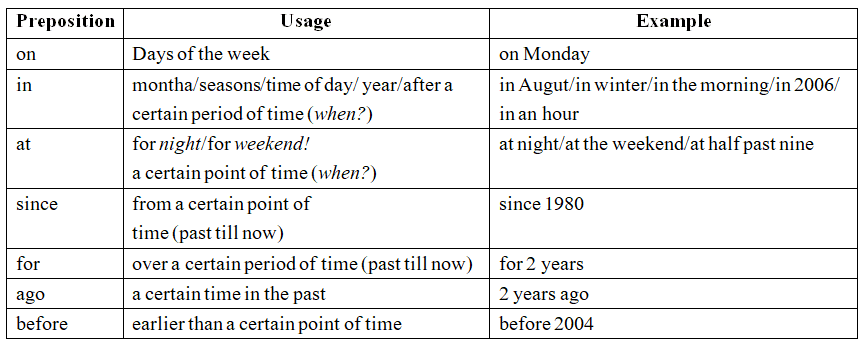

Prepositions – Place (Position and Direction) :
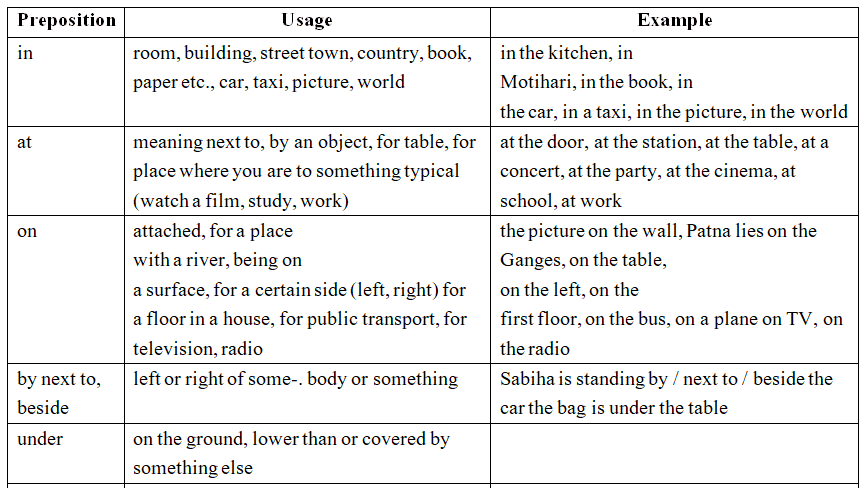


Other important Prepositions :
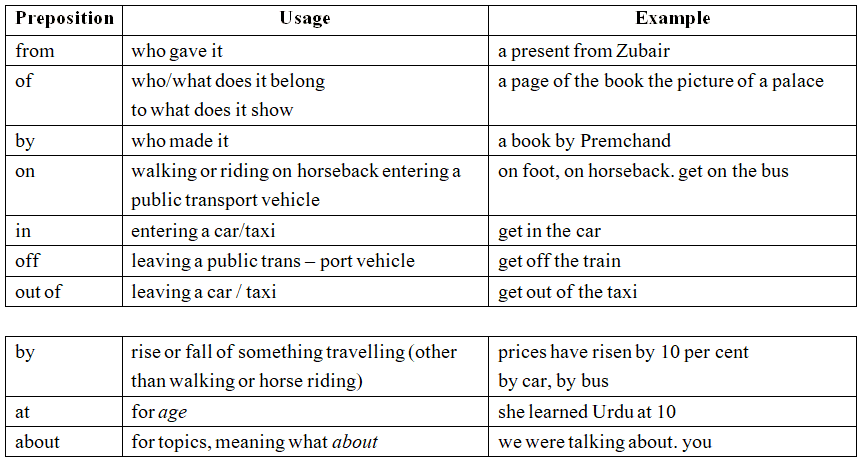
EXERCISES :
Q. 1. Write prepositions in the blanks.
1. The railway station is………. Hajipur Road, ………. the river.
2. They live………. the same roof.
3. I have not seen him ………. last Wednesday.
4. I have known him ………. a long time.
5. The robbers jumped………. the train while it was still moving.
6. Turn ……….. the light! I have to sleep.
7. This is a matter ………. great importance.
8. He has not yet recovered……… his illness.
9. They were arguing ………. who was the first one to see the tiger.
10. Please take ………. your boots. They’re very dirty.
11. I put my hands ………. my eyes because I couldn’t bear to see the crocodiles fight.
12. It took us ………. ten minutes to finish the big bowl………. popcorn.
13. Is there a toilet ………. there?
14. We paddled quickly downstream as our boat was ………. crocodiles and hippopotamuses.
15. He jumped out……….. the car just before it fell ………. a hill.
16. He took an hour to choose ……….. a white dress and a black dress.
17. They decided to take legal action ………. him for driving ……. the influence of alcohol.
18. ………. six years, the hospital is still ………. construction.
19. The lorry was moving ………. full speed when the load of ducks’ eggs fell……….
20. It won’t fall ………. because I have twisted the wire…….. that postto keep it ………. position.
21. ………. the 1990s, he lived alone………. an island………. the coast of Africa.
22. This week she has to work ………. midnight Monday………. Friday.
23. Could I talk to you ……….. a few minutes ?
24. Her room is ………. the corridor ………. the left.
25. Police want to know all ….. it and are calling for witnesses.
26. He blew……. the lamp and lay down……. the ground.
27. Suddenly, the tiger appeared………. him. It pounced ……… him ……… warning.
28. The force ……… the spring threw him away ……. the tiger, and he jumped ……. his feet, ready……. face his enemy.
29. We have not met ………. last October.
30. Books were scattered ………. the room.
31. Fire–crackers are set………. to frighten the evil spirits.
32. Lukicly, the wind died down and the fire began to burn itself ………
33. I lived in Delhi ………. six years.
34. The referee ordered two players ……… the field.
Ans. 1. beside, across, 2. under, 3. since, 4. for, 5. from, 6. off, 7. of, 8. from, 9. about, 10. care of, 11. on,. 12. about, 13. about, 14. before, 15. of, from, 16. from, 17. against, under, 18. from, under, 19. in, blew, 20. out, with, in, 21. During, on, on, 22. till, to, 23. for, 24. by, in, 25. about, 26. off, on, 27. before, upon, after, 28. in, from, on, to, 29. on, 30. in, 31. on,. 32. on, 33. for, 34. in.
D.2. RHYME TIME:
Ex. ‘Me’ in the poem rhymes with ‘see’. Pick out some other rhyming words from the poem.
Add two more rhyming words to the following list :
heel feel – – thing ring – –
lazy hazy – – ball hall – –
sun bun – – cup up – –
shoot boot – – bed red – –
slow blow – – pick lick – –
Ans. Rhyming words from the poem head–bed, grow–slow, ball–all, up–buttercup.
Two more rhyming words for the list:
reel, meal daisy, crazy
run, nun loot, foot
glow, flow sing, wing
roll, fall sup, tup
led, fed sick, trick
E. LET’S TALK :
All of you should look at your shadow at different times of the day and note how different it looks every time and why. Discuss whether your shadow behaves differently from the shadows of other.
Ans.
Ritu : Our shadows look different every time. Can you say, Minu, why ?
Minu : A shadow is formed with the position of anything against the light. So, as the relative position of the light or the object changes, the shadow differs.
Moni : Does your shadow behaves differently from that of others ?
Kitoo : No, all the shadows behaves alike according to the positions of objects in connection with the light.
F. COMPOSITION:
Q. Write a paragraph on ‘What I like and dislike about my shadow’.
Ans. What I like and dislike about my shadow
My shadow is very pleasing. It always accompany me in the light. I like it very much. It reflects my figure and moves with me. It changes its position and form and amuses me in the way. All these things I like very much. But, I dislike its different shapes. Sometimes it grows too much, and sometimes becomes too little. It is not like a real one. And, so I dislike this of my shadow.
G. TRANSLATION:
Translate the following into English:
मुझे प्रकाश में अपनी परछाई दिखती हैं। जब मैं चलता हूँ, वह भी चलती है। जब मैं रुकता हूँ, वह भी रुकती है। परन्तु वह अंधेरे में छिप जाती है। कभी वह बहुत लम्बी होती है और कभी वह बहुत छोटी हो जाती है। उसका रहस्य मुझे समझ में नहीं आता है ।
Ans. My shadow is seen in light. It, too, moves when I move. When I stop, it, too, stops, But, it conceals itself in darkness. Sometimes it becomes very long and sometimes very short. Its mystry does not comes to my mind.
SOME OTHER IMPORTANT QUESTIONS WITH ANSWERS
Q. 1. Who has written the poem ‘My Shadow’?
Ans. Robert Louis Stevenson has written the poem, ‘My Shadow’.
Q. 2. Give the summary of the poem, ‘My Shadow’.
Ans. See the summary of the lesson on page 138.
Q. 3. What is the use of our shadows?
Ans. Our shadows have no practical use in our life. It only shows the direction and angles of light.
BSEB Class 8 English Book Chapter 13 My Shadow Solutions
Read more – Click here
YouTube Video – Click here
Leave a Reply